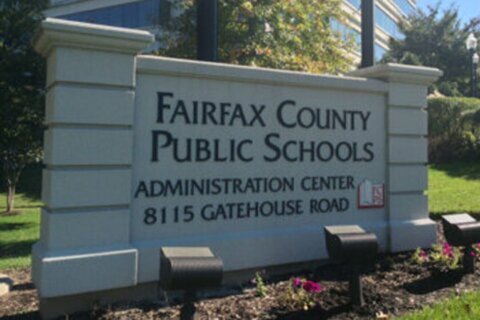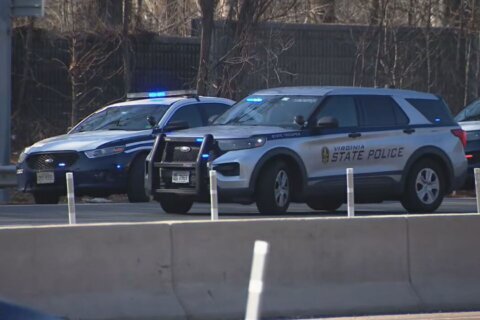This article was republished with permission from WTOP’s news partner InsideNoVa.com. Sign up for InsideNoVa.com’s free email subscription today.
This article was written by WTOP’s news partner, InsideNoVa.com, and republished with permission. Sign up for InsideNoVa.com’s free email subscription today.
Amid scattered protests and walkouts, Virginia Gov. Glenn Youngkin addressed George Mason University’s graduating class Thursday, calling the more than 11,000 graduates the “builders” of Virginia’s future.
Youngkin gave the school’s 2023 commencement address in spite of protests over his choice as the university’s guest speaker for the ceremony. Several dozen students could be seen walking off the EagleBank Arena floor in protest when Youngkin began his remarks, but most remained in their seats and listened along, with some offering a standing ovation when he finished.
Youngkin largely stayed away from politics in his remarks, focusing instead on the individual stories of three 2023 graduates and the more than 1,100 first-generation students, part of what the university said was the largest and most-diverse graduating class in the history of the commonwealth.
“We are stronger because no matter your faith, no matter your nationality, no matter your race, your culture or creed, as you walk across this stage you will have the opportunity to become a builder of Virginia, a builder of this nation, a builder of this world,” he said.
“ … A world that needs your strong foundation, a world that needs your resilience and your passion. Now, this is my challenge to you: Do not be afraid of criticism. Keep going, keep pushing, and keep dreaming. The world needs builders, and you will build.”
As he left the podium, Youngkin stood and smiled as Galilea Sejas-Machado, the commencement’s senior speaker, held up a sign reading “MASON DEMANDS ACTION,” a reference to the protests over Youngkin’s selection.
In earlier remarks at the commencement, GMU Board of Visitors Rector Horace Blackmon said it was a “long Mason tradition” to invite the commonwealth’s chief executive to address graduates. Former governors Jim Gilmore, Mark Warner, Tim Kaine and Terry McAuliffe all spoke at Mason’s graduation during their tenure.
But some student groups had called for the university to rescind its invitation since the announcement that Youngkin would be speaking was made in March.
Groups including the Democrats at Mason and the Black, African-Heritage, and Caribbean Coalition encouraged students to stand up and walk out during his remarks, citing the Virginia Department of Education’s “model policies” on trans students in the state’s public schools, among other things.
“The Youngkin Administration opposes LGBTQ+ rights and has rolled back protections for trans students, while introducing policies that would force educators to out closeted LGBTQ+_ students,” the college Democrats wrote in an Instagram post. “Why should trans and other LGBTQ+ graduates be forced to listen to a speaker who wants to strip them of their rights?”
A Change.org petition organized by 2023 graduate and Mason NAACP chapter president Alaina Ruffin, meanwhile, garnered over 8,000 signatures in opposition to the choice of guest speaker. Some graduating students could be seen holding “Students against Youngkin” signs, while others wore shirts opposing the model policies as they walked across the stage to receive their diploma.
Other students, however, supported the university’s choice and defended Youngkin’s selection as the chief executive of Virginia.
“So many fellow College Republicans at GMU worked our butts off in 2021 to make this man Governor,” College Republicans member and 2023 graduate Joe Szymanski wrote on Twitter from his seat at Eagle Bank Arena. “And today he speaks at our school’s commencement! A fantastic day.”
In March, GMU President Gregory Washington defended the choice, saying students should learn to listen to those with whom they disagree and opposing efforts to “silence” others.
In his remarks on Thursday, Washington highlighted a debate over abortion that he saw at Mason’s Arlington campus last summer. The two sides, he said, agreed to terms on the demonstrations, agreed not to photograph or demonize each other on social media and gave room to one another to make their points.
“Two groups of Mason students, representing both sides of this contentious issue, showed up at our Mason Square campus in Arlington to demonstrate. Their passions could not have run higher … and there they were on the same plaza, determined to be heard. As an administration, we were nervous … I was nervous,” Washington said.
“Their chants and shouts were joined and went back and forth like a tennis match. And when each had their say, they left in peace. Neither side was silenced, nor tried to silence the others. In the end, they came and they left as Patriots. That is who we are.”
Speaking before Youngkin, Sejas-Machado began her senior speaker remarks with a land acknowledgment to several Virginia Native American tribes. Without mentioning Youngkin by name, she spoke about the importance of solidarity within marginalized communities.
“People and systems are placed in society that … continues to be detrimental to our marginalized communities. Simply sharing your story or having your group of people with a shared experience is not enough to protect you,” she said.
“Instead, the impact of our words and stories can create waves of change for future generations … These past four years have shown us that social and racial injustices happen daily, and I cannot promise that they will get 100% better … Whatever guides your actions, morals or perspectives, keep it closer to your heart and find others who support and elevate you.”







